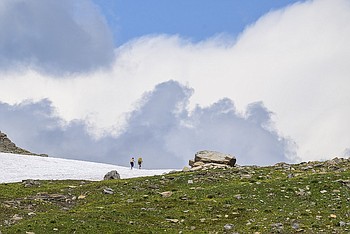Glacier receives $300,000 for habitat restoration, addressing climate change
TAYLOR INMAN, Daily Inter Lake | Whitefish Pilot | UPDATED 1 year, 5 months AGO
A roughly $300,000 infusion of federal funds from the Inflation Reduction Act and Bipartisan Infrastructure Law will support Glacier National Park’s efforts in restoring natural habitats and addressing the effects of climate change, officials said this week.
A portion of the funding will initiate studies, in cooperation with the Blackfeet Nation and other partners, to monitor and analyze environmental conditions associated with the reintroduction of bison adjacent to the park.
As part of the tribally-led Iinnii Initiative, the Blackfeet Nation released a small herd of bison from its captive herd into the Chief Mountain, or Ninnaastakoo, area of the Blackfeet Reservation.
The Iinnii Initiative is a collaboration to restore free-ranging bison to the landscape after a 125-year absence. ‘Iinnii’ in Blackfeet language means free ranging bison. Both Glacier National Park and Waterton Lakes National Park are participants in the initiative.
About $750,000 in Inflation Reduction Act funds will go to nine parks including Glacier while an additional $99,500 from Bipartisan Infrastructure Bill will go to Glacier, Yellowstone and Grand Teton national parks for projects to restore threatened whitebark pine and implement the National Whitebark Pine Restoration Strategy. The project includes working with partners and tribes to plant blister rust resistant seed and seedlings, identify rust resistant trees, monitor seedling survival and identify climate refugia.
The project builds on 20 years of work at Glacier National Park and within the Greater Yellowstone Ecosystem.
The acts will provide a total of $52 million to the National Park Service to fund projects throughout the country related to ecosystem resilience, restoration and environmental planning needs.
“Without these actions, threats from plant disease, beetle infestation, changing fire regimes and climate change could cause irreversible loss of whitebark pine and the ecosystem services provided by whitebark pine forests,” Glacier vegetation and program manager/biologist Dawn LaFleur said in a statement.
Additionally, Inflation Reduction Act funding will be used to assess the climate change vulnerability of water supplies throughout Glacier National Park in an effort to increase their security and sustainability, develop adaptation strategies and inform investment decisions.
Through the Bipartisan Infrastructure Law and Inflation Reduction Act, the National Park Service is working to address the impacts of the climate crisis, including intensifying drought, wildfires, flooding and legacy pollution in national parks and other public lands. Resources are making significant strategic investments to repair critical facilities and infrastructure and enhance conservation through ecosystem restoration and recreation opportunities.



